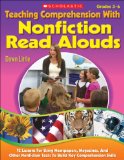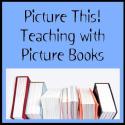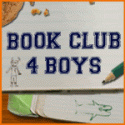Today’s guest post is by Julie Niles Petersen of www.Twrctank.com “TWRC” stands for Think, Wonder, Reflect, and Connect. At www.twrctank.com Julie blogs about the intricacies of teaching reading. Her blog is extremely informative and she provides a ton of resources that are helpful to educators and parents, alike. After having only known Julie for several months on Twitter, I had the pleasure of meeting her IRL at the International Reading Association’s Annual Convention in Chicago this year. What fun we had! In addition to the TWRCtank, Julie can be found on Facebook and on Twitter (@twrctankcom), where she is a valuable source of reading information and part of my PLN (Personal Learning Network). When I asked her to provide me with a guest post for The Literacy Toolbox this month, she came through in spades when she wrote this fantastic article, filled with numerous resources, explaining why and how to motivate readers.
Children are usually reluctant to read for two reasons. 1) They struggle with one or more aspects of reading, or 2) because they find it boring. Often, it is a combination of the two. After receiving my reading specialist credential, I began working exclusively with struggling readers. As you would guess, they did not like to read. Getting them motivated to read (and building their reading stamina) was of the utmost importance to me. Why? Because not reading hurts them in many ways. Here are two of the most important:
- Their vocabulary does not grow as fast or as large as it does for their peers who read. Most of the words we know, we learned by reading. If we do not read much, we will not know many words. Why is that important? Well, the size of a child’s vocabulary is closely linked to reading comprehension and overall academic success. Students with the largest vocabularies do the best on academic tests, get into the best schools, are able to more clearly express their thoughts, and usually make the most money. The size of our vocabulary also influences how others perceive us.
Click here to go to the University of Oregon’s Center on Teaching and Learning to see some great charts and a summary of some important vocabulary research. Personally, I wish all parents knew this information. If they did, I think many more children would be read to and talked with in the home. For more on the importance of talk in the home, click here.
- Their knowledge of the world (or background knowledge) is not as large and varied as it is for their peers who read. The more we read, the more we understand the world around us. Why is that important? Well, people and authors do not tell us everything; we must make inferences in order to figure out the missing parts. An inference is when we come to a logical conclusion by connecting our background knowledge with what we hear or read.
For instance, if I told you that I saw my neighbor clutch his left arm and fall to the floor. Most of you will infer that he was having a heart attack because you have background knowledge of heart attack symptoms. Without this knowledge, you would have been left wondering why he fell. Normally, I am a huge fan of wonder because I believe it leads to deeper thinking and better connections. However, I worry about the struggling readers who have very limited world knowledge. I am sure they are left wondering without a way to connect the dots so often that they truly believe reading does not make sense. Unfortunately, they do not realize that their reading is not making sense because of their limited world knowledge.
Think about political jokes for a second. If you do not have much political knowledge, you will not get the punch line because you cannot connect the dots. Imagine having to listen to political jokes every day knowing you will rarely understood the punch line. Would you be reluctant to listen? I think so.
Reading comprehension requires a large vocabulary, wide and varied world knowledge, and good inference skills. As the famous slogan goes, “The more we read, the more we know.” And the more we know, the better inferences we can make (and the more laughter we will have in our lives.)
For an even clearer understanding of the importance of background knowledge, watch this fabulous ten minute video, “Teaching Content Is Teaching Reading” by Daniel Willingham at www.newamerica.net
Suggestions for Struggling Readers
Since going into all the reasons a child struggles with reading is beyond the scope of this post, let me offer you some suggestions to help motivate struggling readers in general.
- Let them read audio books. Struggling readers are often embarrassed by the fact that they cannot understand the same books their peers read. Giving them audio books help them do so–especially when their main difficulty lies in decoding rather than vocabulary, background knowledge, or ability to reason. You can purchase audio books, but you can also get them free from public libraries. Personally, I loved listening to audio books as I commuted to and from work. Sure, I was not technically reading them, but I was building up my vocabulary and background knowledge as I listened. If I had been carefully looking at the words in the book as it was read aloud to me, I also would have been helping my decoding skills. In case you are wondering… my struggling students loved audio books.
- Closed captioning. Use the closed captioning feature on your television. (It is usually on in my house.) Because of how our brains are wired, we are almost forced to look at the words as they scroll across the screen. My husband is a second language learner and I think it helps him more than he admits. (He grumbled a lot when I began doing this, but I have not heard him grumble about it for a long time.) Although I am not a second language learner, I have been surrounded by people with limited vocabularies my entire life. I read a lot growing up, but I did not hear many people use the rarer words I learned by reading. Thus, I have many words in my reading vocabulary that are not in my speaking vocabulary. I love it when a word comes across the screen that makes me think, “Oh! So, that’s how you pronounce that!” Further, it is fun to spot words on the screen that do not match what the actors say. I imagine children would get a kick out of that, too. Another great thing about closed captioning is that it also includes words that the actors do not say, but that add to the feeling of the moment, such as “ominous music plays.” If you are a hearing person while reading that, you should easily be able to figure out the meaning of that rare word.
One more thing about closed captioning… students in Finland often score the highest on international reading tests. Researchers attribute some of their success to the fact that Finland does not produce many of their own television shows; they import them from other countries and use Finnish subtitles. So, Finnish children who watch a lot of television also get a lot of reading practice at the same time.
- Read aloud to them. Read aloud to your children and do not stop once they can read on their own. Like audio books, you can read aloud books at a higher level than your children can read on their own. If you stop and discuss challenging vocabulary with them, you will help build their vocabulary. Further, you can help them build background knowledge by discussing difficult concepts as they arise. If you have difficulty reading aloud, find a designated reader–perhaps an older sibling, a neighbor, or another relative. There are websites where you can find people reading aloud popular children’s books. I have listed several of them in the sidebars on the right-hand side of my blog. Scroll down until you see, “External Link Categories” and then to, “Online Reading Material for Kids.”
One of my favorite tips about reading aloud to your children comes from Jim Trelease. I was fortunate to hear him speak on two separate occasions. He recommends that parents read to their children as they do the dishes. Isn’t that great? The chores will get done while your child is improving their vocabulary and background knowledge. Further, a great book makes for great discussion. Great discussion creates interest and leads to positive feelings. Positive feelings lead to intrinsic motivation (wanting to do it for the sake of doing it, not for any type of reward.) It is definitely a win-win situation, don’t you think?
A final point is to be sure and ask your child, “What do you wonder after hearing this?” Kids start out in life full of wonder, but schools repeatedly make them believe there is only one correct answer to everything. Thus, children begin to lose their sense of wonder, or they wonder so often as I previously mentioned, that they no longer find joy in doing so. When your children share a wonder, think it through with them. Help them learn to connect the dots.
Celebrate wonders that cannot really be answered (ex. Why did slavery exist?) because they lead to deeper thinking and reflection. Discuss possibilities. Talk about whether ideas are probable or improbable. Show them how to find more information that will lead to better thinking. Deeper thinking and reflection leads to better understanding. It also leads to more engagement and an excitement about continuing to read and learn.
- Have plenty of reading material in the home–including fiction books, informational books, magazines, graphic novels, comic books, and a good student-friendly dictionary, such as a Longman or Collins COBUILD dictionaries. The more we read, the better we get–especially when what we read is at our independent level and of interest to us. Keep reading material scattered throughout the house, but especially in the bathroom and near the kitchen table. A lot of reading goes on in both places when we are alone. (That is another Jim Trelease gem.) Keep reading material in your car and be sure to bring it into places where you know you will have to wait, such as the doctor’s office. If you cannot afford to buy reading material, get it from the library. Even if you can afford it, go to the library. Great librarians keep on top of all that is popular with children and they are experts at matching books with a child’s interest and reading ability. If you can afford to purchase books, be sure to take your child to the bookstore and let them decide what to purchase (with your guidance of course). Being able to check out books from the library is great, but having your very own book that you can write your name in is even better.
Note: A recent study shows that the amount of books in the home makes a huge difference in a child’s academic career. Click here to read more.
- Help them find some favorite book series, genres, and authors. Let’s think of book series as television sitcoms for a minute. Imagine never having watched “Friends” and then watching an episode from the middle of its run. Do you think you would get as much out of that episode as someone who had watched the show from the beginning of its run? No, you would not because you do not know the characters, their history, their inside jokes, etc. The more familiar you are with the characters and their history, the easier it is to understand their motivations and actions. This is the main reason I often recommend popular book series to struggling readers.
Familiarity with genres also helps comprehension. Genres are a way to categorize different things. There are television genres (ex. cartoons, sitcoms, dramas, reality TV, soap operas, talk shows, etc.); movie genres (ex. romantic comedies, documentaries, musicals, westerns, thrillers, etc.); musical genres (ex. rock-n-roll, country, reggae, hip-hop, classical, etc.); and literary genres (ex. poetry, fantasy, mystery, biographies, science fiction, etc.) After repeated experiences within a genre, your familiarity with them helps you understand future encounters because you know what to expect.
Good readers often have a favorite literary genre. Struggling readers often do not. Usually, they do not even understand the genre concept. Relating literary genres to television, movie, and musical genres helps greatly because most have a favorite in each–especially in music.
Although it is important to have a favorite genre, it is best to read from more than one. Why? Because reading from multiple genres helps widen and vary our world knowledge. Our goal is to get reluctant readers familiar with the similarities and differences within each genre and to make sure they sample them all. How can they know if they like something if they never try it?
The same goes for authors. Good readers tend to have favorite ones. Struggling ones do not. Why is it important for students to have a favorite author? One reason is that when we really like the way authors write, we look forward to reading more of their work. In other words, we are motivated to read more.
I will share some resources at the bottom of part two that should help you find the perfect book for your child. You can search most of them by series, genres, topics, authors, and/or reading abilities.
- Poetry. Funny poetry is enjoyable by just about everyone. I have not yet met a reluctant reader who did not love funny poems. Here is a blog post I wrote that has recommendations for poetry anthologies, resources, and websites. Consider having a family poetry night where all family members read aloud a poem of their choosing. Often when we know we will perform in front of others, we do a lot of practicing so that we will be at our best. Reluctant readers could use a lot of practice with a piece of text they like. Perhaps you might even want to videotape them. Now that would make for some great home movies, don’t you think?
How do you encourage reluctant struggling readers?
To be continued. . .



















